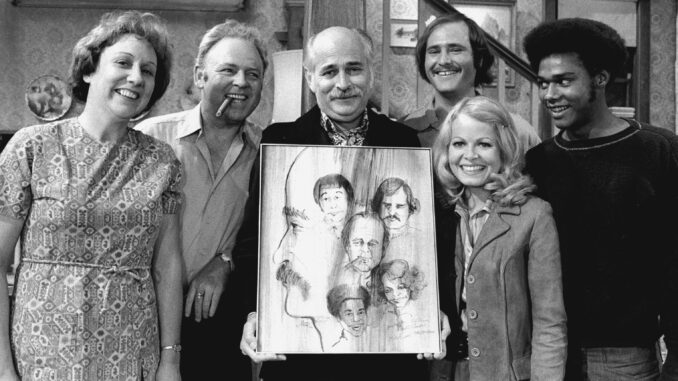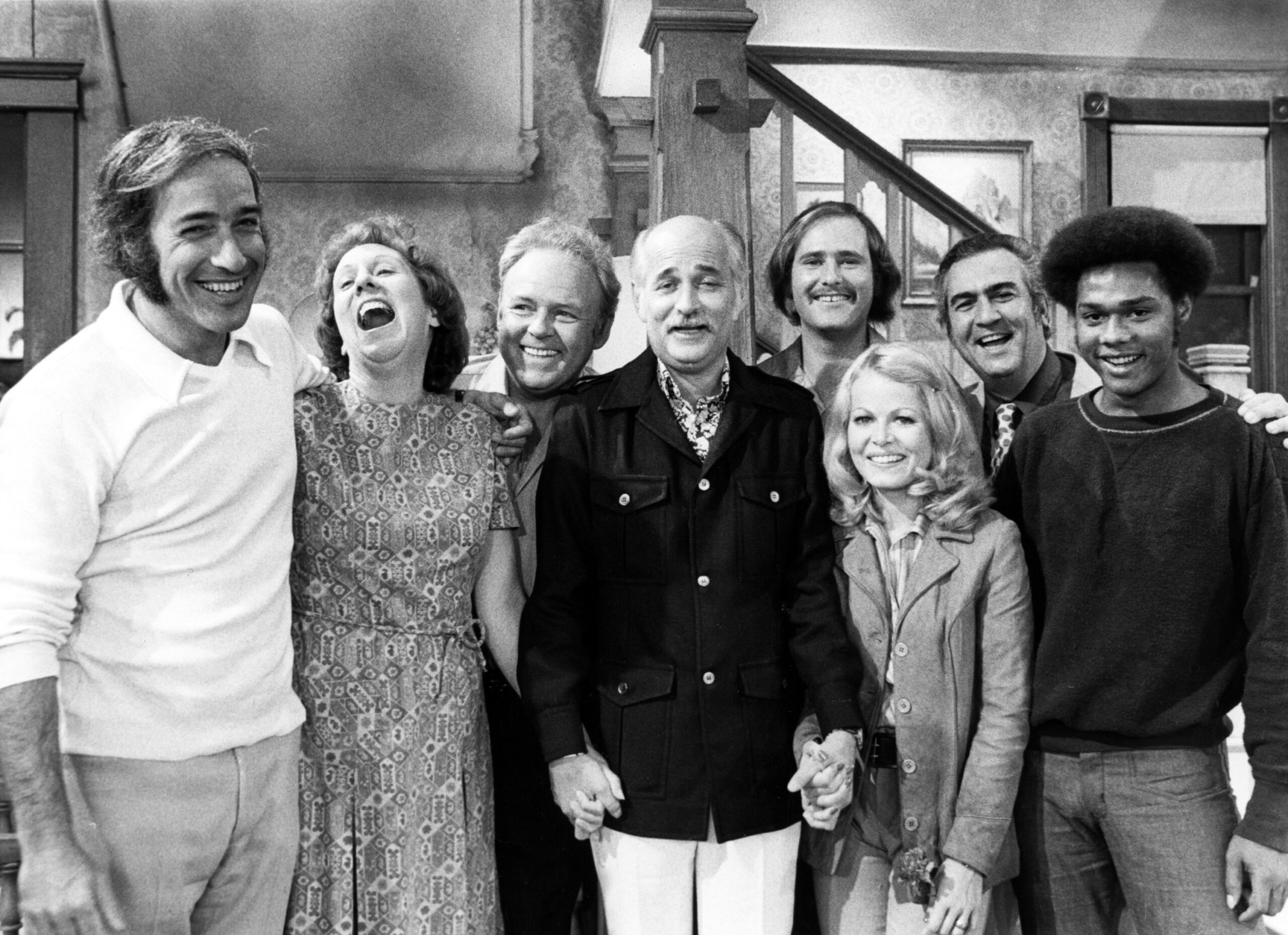
Few television shows have left as lasting a mark on American culture as All in the Family. From its groundbreaking debut in 1971 to its emotional farewell in 1979, the sitcom redefined what television comedy could be — raw, real, and relevant.
At its heart, All in the Family wasn’t just a comedy about a working-class family from Queens. It was a mirror held up to America, reflecting our laughter, struggles, and imperfections. Even decades later, its influence is everywhere — not just in TV scripts, but in the way we talk, think, and challenge the world around us.
Let’s take a heartfelt journey through the emotional legacy of this one-of-a-kind show that dared to make us laugh while making us think.
The Show That Changed Television Forever
When All in the Family premiered, television had never seen anything like it. At a time when sitcoms played it safe, Norman Lear’s creation broke every rule. It was loud, controversial, and unapologetically real.
Archie Bunker, played brilliantly by Carroll O’Connor, became both the symbol of the old-fashioned American everyman and the face of change resistance. His wife, Edith Bunker, portrayed by Jean Stapleton, softened every harsh word with warmth and wisdom.
Together, they turned comedy into conversation — and laughter into reflection.
Norman Lear’s Bold Vision
Creator Norman Lear didn’t set out to make people comfortable — he set out to make them think. He took taboo topics like race, religion, gender, and politics and dropped them right into America’s living rooms.
It was risky, even revolutionary. But Lear believed that humor could open minds. All in the Family proved him right. The show didn’t lecture; it laughed. And somehow, through that laughter, people started to see themselves in Archie, Edith, and their family.
Archie and Edith — The Perfect Imperfect Couple
The heart of the show wasn’t its politics — it was its people.
Archie and Edith Bunker were opposites in every sense. Archie was gruff, opinionated, and often wrongheaded. Edith was patient, gentle, and endlessly forgiving. Together, they represented the push and pull between the old and new America.
Their love story wasn’t polished, but it was real. That’s what made it powerful. Viewers saw their own parents, neighbors, or even themselves reflected in that little Queens row house.
ean Stapleton’s Magic as Edith
Jean Stapleton’s performance as Edith Bunker was pure heart. She brought warmth and authenticity to every scene — a steady light in the chaos of Archie’s world.
Her unique laugh, her innocence, and her empathy made Edith the emotional anchor of the show. When she spoke, the noise stopped. When she smiled, we all did too.
And when she was gone, the silence she left behind was deafening.
The Show’s Courage to Confront Real Life
Most sitcoms of the era avoided controversy. All in the Family ran toward it.
The show tackled racism, sexism, war, menopause, homosexuality, and even rape — not for shock value, but to spark conversation. Each episode balanced humor with humanity, teaching that laughter and understanding could coexist.
In an age before social media debates and viral outrage, All in the Family was America’s first honest dialogue — one half-hour at a time.
The Emotional Weight of Edith’s Goodbye

When All in the Family transitioned into its spin-off, Archie Bunker’s Place, viewers faced one of television’s most heartbreaking moments: the death of Edith Bunker.
Jean Stapleton had chosen to leave the role, feeling Edith’s journey was complete. Rather than replace her or quietly write her out, Norman Lear made a daring choice — Edith would die off-screen.
In the episode “Archie Alone,” Archie mourns her loss in a scene that remains one of the most powerful moments in TV history. Watching the tough, stubborn Archie break down while clutching her slipper reminded everyone that behind the laughter was love — and loss.
Why That Moment Still Resonates
Edith’s death wasn’t just the end of a character. It was the end of innocence — both for Archie and for the audience.
Television had never shown grief so honestly. There were no violins, no melodrama. Just a man realizing that the person who softened his rough edges was gone.
Even now, that scene is studied for its emotional truth. It reminded viewers that sitcoms could do more than entertain — they could heal, too.
The Supporting Cast That Brought the Bunkers to Life
Beyond Archie and Edith, the show’s ensemble helped elevate its brilliance.
-
Sally Struthers as Gloria brought youthful passion and feminist energy.
-
Rob Reiner as Michael “Meathead” Stivic embodied the liberal, educated counterpoint to Archie’s traditionalism.
Their constant debates around the dinner table weren’t just funny — they were the pulse of a changing America.
Laughter as a Tool for Change
One of All in the Family’s greatest achievements was using laughter to challenge prejudice.
Archie said things that made people cringe, but they also made people reflect. Through humor, the show exposed the absurdity of bigotry without preaching. Viewers laughed with him, sometimes at him, but always learned from him.
It was social change disguised as a sitcom — a masterstroke of storytelling.
Ratings, Recognition, and Revolution
During its run, All in the Family dominated television ratings. It was the #1 show in America for five straight years (1971–1976) — a feat few shows have matched.
It won 22 Emmy Awards, including Best Comedy Series, and launched multiple spin-offs: Maude, The Jeffersons, Good Times, and Archie Bunker’s Place. Each explored new stories inspired by Lear’s fearless vision.
But the true reward wasn’t trophies — it was impact. The show changed how TV could tell the truth.
The Cultural Shockwave It Created
When All in the Family aired, America wasn’t ready — but it needed it.
The show opened conversations in homes that had never spoken about race or gender roles before. It gave voice to the silent frustrations of working-class families and made political dialogue accessible through humor.
In a way, All in the Family didn’t just entertain America — it educated it.
How Modern Sitcoms Owe It All to the Bunkers
Without All in the Family, shows like Roseanne, The Office, Modern Family, and Abbott Elementary might not exist.
These modern comedies blend humor and heart, using laughter to explore social truths — a formula Lear perfected decades ago.
Every witty comeback and heartfelt moment on TV today carries a little bit of All in the Family’s DNA.
The Enduring Message — We’re All a Little Like Archie
What made All in the Family timeless was its honesty. Archie wasn’t evil; he was flawed. He reflected our biases, fears, and blind spots.
The genius of Norman Lear’s writing was showing that change doesn’t happen overnight — it happens through understanding. And sometimes, it starts with laughter.
Why the Farewell Was Bittersweet
Saying goodbye to All in the Family wasn’t just saying goodbye to a TV show. It was saying goodbye to an era.
It reminded us that progress is slow, love is messy, and laughter — even in the darkest moments — brings people together.
Even decades later, its message still rings true: families may fight, generations may clash, but love and understanding always find a way.
The Emotional Legacy That Lives On
More than 40 years after its final episode, All in the Family remains a cultural touchstone.
It wasn’t just a sitcom — it was a social experiment, a mirror, and a movement. Its humor still lands, its lessons still matter, and its heart still beats in the stories we tell today.
The show dared to be honest, and in doing so, it became immortal.
Conclusion
A Bittersweet Farewell indeed — because All in the Family wasn’t just a chapter in television history; it was a turning point. It proved that comedy could challenge, heal, and unite.
From Archie’s rants to Edith’s compassion, every laugh and tear was a reflection of who we are — imperfect, evolving, and deeply human.
And while the Bunkers may have left our screens, their legacy continues to echo in every heartfelt sitcom that dares to tell the truth.
